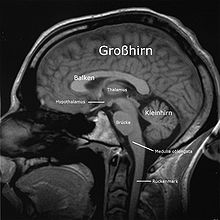Akuem (phonetics)
An acuem is a phonic and articulatory element that combines breath pressure, speech rhythm, the type of faucous distance (width or tightness in the throat), register areas, nasal tone and excess air and is to be understood as a unit as a mood characteristic. So an acute is a tendency of the emotional state.
A total of five classes (including a mixed class) are distinguished (according to Schnauber ):
- Acuem class A: physical well-being, sensual pleasure, food intake, joyful emotion, tenderness, sympathy, admiration, flattery, humility, pity, forgiving kindness, temptation, request, longing, amazement.
- Akuem class B: physical discomfort, physical pain, emotional pain, crying, disgust, contempt, pride, anger, anger, hatred, defiance, sulking, fear, shock.
- Akuem class C: Male advertising, pursuit of values, courage, audacity, love of affect, exuberance, jubilation, laughter, doubt, curiosity, intellectual speech.
- Acuem class D: physical fatigue, resigned suffering, shock.
- Mixed class: adoration, awe, reproach, warning, pride, shame, boredom, hope, worry.
Example of how Akuemen works - Hitler's and Goebbels' rhetoric
One can observe the phenomenon that the speaker's vocal values can produce the same vocal values in the listener, so that anger in the speaker's voice can generate anger in the listener's mind . Acuems in the speaker's voice thus work in the mind of the listener.
Adolf Hitler's way of speaking, for example, according to a linguistic-psychological investigation, predominantly shows characteristics of acuem class B, because it contains the acuems of contempt, anger, anger, hatred and defiance. The rhythm here is ergotropic, i.e. performance-enhancing and causes a general tension in the voice. It should not be ignored here that the classification of language features also allows information about one's own character traits. It has also been proven that Hitler was able to consciously and skillfully intensify and increase the acueme in his speeches. This further leads to the conclusion that Hitler was well aware of the effects that the nature of his rhetoric could produce.
Joseph Goebbels ' way of speaking, on the other hand, belongs more to acuity class A, the characteristics of which include balance, trophotropic rhythm, i.e. general physical well-being, admiration, longing and sympathy. A tendency towards ergotropic rhythms can often be observed with Goebbels, but the acuems of class A can be defined as the basic articulatory tendencies.
Although Hitler's rhetoric and Goebbels' rhetoric were fundamentally different, both ways of speaking produced a prosodic experience in the listener. By constantly listening to such speeches, the language experience shifted from the dominance of the cerebral cortex to the dominance of the brain stem , especially the thalamus . If the language experience shifts so much to the part of the brain that is responsible for involuntary and emotional, i.e. non-rational processing, the ability to critically analyze a speech is severely restricted because the cerebrum is paralyzed. This partly explains the high effectiveness of Nazi rhetoric and at the same time also the strikingly emotional and euphoric reactions of the listeners.
See also
literature
- Kenneth Burke: The rhetoric in Hitler's "Mein Kampf" and other essays on the strategy of persuasion . Suhrkamp, Frankfurt am Main 1971.
- Cornelius Schnauber : How Hitler spoke and wrote. On the psychology and prosody of fascist rhetoric . In: Reinhold Grimm (ed.): Writings on literature 20 . Athenaeum, Frankfurt am Main 1972.
- Heinrich Lausberg: Elements of literary rhetoric . 10th edition. Hueber, Ismaning 1990, ISBN 3-19-006508-X .
- Eric Hoffer: The Fanatic and Other Writings . Eichborn, Frankfurt am Main 1999, ISBN 3-8218-4180-X .
- Victor Klemperer: LTI - a philologist's notebook . 22nd edition. Reclam, Stuttgart 2007, ISBN 978-3-15-020149-7 .
